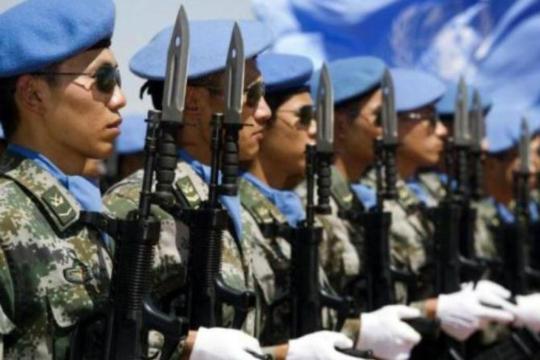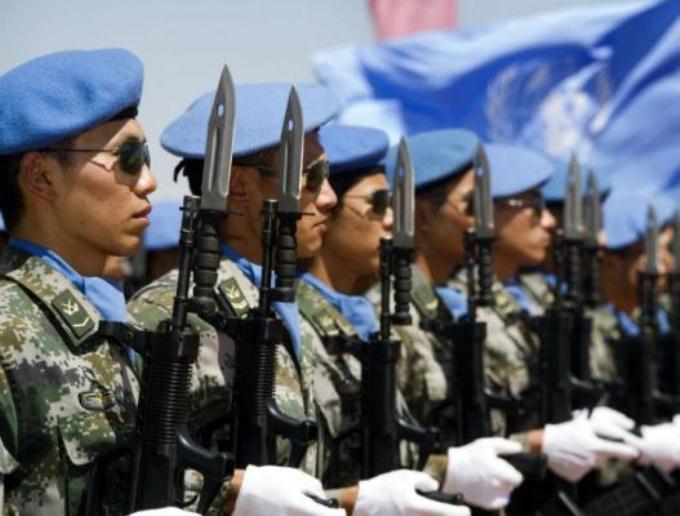
 |
| Chinese peacekeepers in South Sudan [Reuters] |
| Abstract In its continuing effort to expand its interests, how is China managing its balancing act of cultivating deeper ties with Sudan and South Sudan? In seeking to answer this question, the article examines how China continues to maintain strong ties with Sudan, which is Beijing’s third largest trading partner in Africa (after Angola and South Africa). Meanwhile, China remains Sudan’s largest trading relationship – significantly outpacing Khartoum’s ties with the West. Of course, the relationship remains rooted in energy ties – specifically, Beijing’s importation of oil from Sudan. However, as Chinese interests in Sudan intensify, Beijing has taken a larger role on peace and security issues, especially in the South Sudan. After Sudan’s partition in 2011, China finds itself taking a balanced and risk management approach to both countries in an effort to secure its investments. |
Introduction
China’s courtship of Africa remains a serious driver of it foreign policy and its push to secure natural resources to feed its export-driven economy. Beijing’s trade with the continent is now double that of US-Africa trade, after surpassing Washington as Africa’s largest trading partner in 2009.(1) Moreover, China provides half of its overseas development assistance to Africa. Despite these numbers, the underlying concentration of Beijing’s interest in Africa remains on natural resources – as evidenced by the fact that it imports over $100 billion annually from continent of crude oil, raw material and other resources.(2) Two of the most significant countries to China in this regard are Sudan and South Sudan – the remnants of an oil-rich country that was partitioned in 2011 after years of conflict. The division of Sudan into two separate countries has resulted in significant policy adjustments that guide Chinese engagement with Khartoum. Beijing remains Sudan’s largest investor with more than $5 billion invested in both countries’ oil field developments. While traditionally focused narrowly on Sudan’s oil reserves, China is now increasingly involved in peace and security issues due to the recent instability in South Sudan.
South Sudan Instability Threatens Chinese Interests
When South Sudan was granted its independence in 2011, Khartoum lost control of a significant amount of its wealth in natural resources. According to a report by the International Monetary Fund, Sudan lost approximately 55% of its revenues after the split. Moreover, Khartoum had to withstand the loss of nearly two-third of its reserves of foreign currency. Juba’s independence has not come without a security cost as well. South Sudan’s ill-equipped military has been embroiled in a violent struggle with armed rebels since securing its independence in 2011. According to last year’s Fragile States Index, compiled by the Washington-based Fund for Peace, South Sudan tops the list as the most vulnerable country and was placed in the “very high alert” category.(3) The most acute areas of concern in the South Sudan now are with respect to the massive flows and refugees and the lack of a stable – and transparent - state security apparatus.(4) There was a short period of calm following Sudan’s partition in 2011, but conflict heightened rapidly in 2013 when disputes broke out between between factions supporting President Salva Kiir and those associated with former Vice President Riek Machar, due to their inability to resolve longstanding disagreements between the ruling party and the army.(5)
The current conflict in Sudan has focused on the sustained unrest in Darfur as well as heightened instability in the South Kordofan and Blue Nile States regions. According to reports from the International Crisis Group, this renewed fighting has resulted in the deaths of 50,000 people and caused the displacement of more than 2 million people.(6) Aside from the significant human catastrophe of the seventeen month long civil war in South Sudan, there also has been a corollary impact on Juba’s significant energy resources and the infrastructure to support them. After years of disagreement, Juba and Khartoum finally agreed in 2013 on a transit fee (to be awarded to the government in Sudan) for the transhipment of oil between South Sudan and Sudan. Despite this, internal conflict in South Sudan then arose and complicated the flow and protection of oil in the country. China, which is traditionally risk-averse when it comes to intervening in conflict zones outside of its borders, has been forced to recalculate its strategy in order to protect is investments as the largest foreign investor in both Sudan and South Sudan’s oil network.
Prior to Juba’s independence, several Chinese oil companies, including China’s National Petroleum Corporation (CNPC), built pipelines from South Sudan’s oil fields to Sudan’s Port Sudan. Indeed, CNPC currently holds a 40% stake in a joint venture that operates in South Sudan’s enormous oil fields. Moreover, according to the Oil & Gas Journal the company “boasts a 1,600 kilometer export pipeline that carries crude through abutting Sudan to Port Sudan.”(7) Moreover, there are more than 120 Chinese enterprises currently operating in South Sudan, with investments of more than $10 billion.
Security Involvement and Forecast
While the CNPC continues to look at ways to enhance its investments in South Sudan, Beijing has also been looking at ways to beef up its security presence there to protect both its citizens on the ground and its financial investments. One of the most significant developments in this respect was China’s decision, last December, to deploy 700 peacekeepers as part of the United Nations Mission in the Republic of South Sudan (UNMISS). The Chinese force, which fully deployed in March of this year, has been well equipped with armored infantry carriers, anti-tanks missiles, mortars and drone technology. Following the decision to deploy the soldiers, Beijing insisted that its motivations were not prompted by its significant investment in the oil sector there. Foreign Minister Wang Yi noted at that time, “China's mediation of South Sudan issues is completely the responsibility and duty of a responsible power, and not because of China's own interests.”(8)
The historical record, however, does not support Beijing’s claim. Indeed, before Sudan’s partition in 2011, China was one of the principal arms suppliers to Khartoum as the government led by Omar al-Bashir looked to violently suppress rebellions in the south and in the western region of Darfur. The division of Sudan then, along with the fact that most of China’s investments were located in the south, forced Beijing to backtrack and court Juba in its transition to power. The UNMISS deployment follows China’s decision to send troops to Mali last year, due to conflict between the government in Bamako and Islamist rebels in the north. These moves are challenging traditional notions China’s role on the continent and could have an impact on its image with a range of partners in the region over the coming years.
In addition to the deployment of the UNMISS detachment, China has also taken strong steps to protect its nationals as a result of the fluid security situation around its oil refineries in the country. Earlier this month, China announced its massive evacuation of more than 400 oil workers in the Paloch region out South Sudan due to ongoing fighting that was reaching close to the refinery. The move was a setback for Juba, which has claimed that it is winning the fight to push back the rebels from the strategic oil fields. Meanwhile, Beijing has few options but to put pressure on the government in South Sudan to work towards a peaceful reconciliation that would stop the conflict before it affects the oil fields. This month, China’s Foreign Ministry urged “both sides (South Sudan government and the rebels) have the responsibility to protect oil infrastructure in South Sudan, as oil is a critical resource in its reconstruction and economic development during the country's peaceful transition period. We urge the conflicting sides to make political decisions and reach reconciliation as soon as possible, and start the substantial transition period”(9)
The forecast for South Sudan remains gloomy with little sign for a cease fire. Moreover, it does not seem that either side – the government or the rebels – has a qualitative advantage significant enough to end the conflict through military means alone. This uncertainty will continue to enhance the risk for China as it gets more deeply involved in protecting its assets in South Sudan.
_______________________________________________________
Copyright © 2015 Al Jazeera Centre for Studies, All rights reserved.
*Jonathan Berkshire Miller is a fellow on East Asia for the EastWest Institute, focusing on US-China relations and also Japan-China tensions in the East China Sea. Miller is also a fellow on Japan for the Center for Strategic and International Studies Pacific Forum and chair’s the Forum’s Japan-Korea Working Group.
Endnotes
1. Fred Drews, “8 Facts about China’s Investments in Africa,” Brookings Institution, May 20, 2014. http://www.brookings.edu/blogs/brookings-now/posts/2014/05/8-facts-about-china-investment-in-africa [retrieved: 27 May 2015]
2. Yun Sun, “Africa in China’s Foreign Policy,” Brookings Institution, 2014, pp. 7. http://www.brookings.edu/~/media/Research/Files/Papers/2014/04/africa-china-policy-sun/Africa-in-China-web_CMG7.pdf?la=en [retrieved: 27 May 2015]
3. Fragile States Index 2014, Fund for Peace, http://fsi.fundforpeace.org/rankings-2014 . [retrieved: 27 May 2015]
5. International Crisis Group, “Sudan and South Sudan’s Merging Conflict,” Africa Report, 223, January 29, 2015. http://www.crisisgroup.org/en/regions/africa/horn-of-africa/south-sudan/223-sudan-and-south-sudan-s-merging-conflicts.aspx [retrieved: 27 May 2015]
7. Global Risk Insights, “Violence in South Sudan Threatens China’s Oil Interests,” Risk Insights, December 2014.
8. Al Jazeera, “China’s Motive in South Sudan?” Al Jazeera, January 13, 2015. http://www.aljazeera.com/programmes/insidestory/2015/01/china-motive-south-sudan-201511319545502114.html [retrieved: 27 May 2015]
9. AllAfrica.com, “China Urges an Immediate Cease-Fire in South Sudan,” AllAfrica.com http://allafrica.com/stories/201505261925.htm l [retrieved: 27 May 2015]